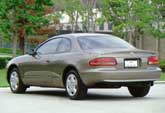Recent Articles
Popular Makes
Body Types
Used Vehicle Shopping Tips
Do your research and ask the right questions before you buy
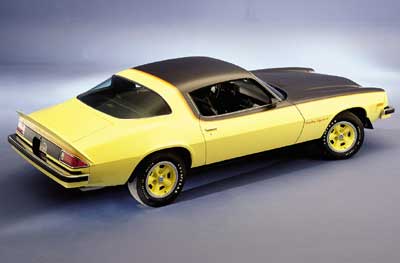
Every Sunday, I would do the same thing: hit the papers with a thin black marker in hand and smudge-thumb through thousands of ½ inch used car classifieds, searching for the perfect used car. I knew what I wanted. Finding it was the hard part - and when I did locate that one used, yellow '76 Camaro with the black interior and less than 50,000 miles, I wasn't going to quibble about things like a pre-purchase examination. I bought it, and beamed. After all -- who needs an inspection when we all know that people are inherently decent; most won't dupe or rip off another human, right? I still thought that when the passenger window refused to stay up. Oh, it would roll up with no trouble and stay there, as long as you kept your hand on the window. But who needs a window -- I have a jacket, after all, and it really doesn't get very cold in southern California. Still, something inside told me that I should have checked that before I bought the car. I shrugged it off. But when the Camaro exploded in a ball of white smoke and flames, I knew it to be true. I got ripped.
Page 2: Do
Today, it's much easier to buy a good used car, for one simple reason - the Internet. The onslaught of information available via automotive and government websites makes it hard not to find a good used car at a fair price. The best way to go about it is to create a profile of your ideal used vehicle. Be as specific as possible, include preferred options, color, acceptable mileage range, and the approximate price you're willing to pay. Take your profile and shop used car classifieds, making a list of potential vehicles as you go. Narrow this list to a few select vehicles that fit your profile. The profile will help you find the car you really want. But you still have to follow some basic dos and don'ts in order to get that dream car into your garage: DO -- Turn into an automotive "private eye", with the Internet as your information-gathering tool. Check current trade-in and market values, as well as recalls on that model year. Read reviews, and study reliability information and safety ratings. There are a number of quality websites that offer this information at no charge. If everything checks out, take your research to the next step: investigate the specific car you plan to purchase, and order a specific used vehicle history report. Consider the rate of ownership change. Ideally, a 2 year-old-car should have one owner, and a five-year-old car shouldn't have more than two owners. Multiple owners may be a warning sign. Also, remember to ask the owner or dealer to provide service records. Note: dealerships will only have service records for vehicles they service in-house. If they do have records, however, chances are that they'll be well organized and complete.
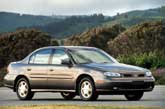
Page 3: Do
DO -- Study pricing. Often, a significant price fluctuation - a 2002 Ford Explorer for $2000 less than market, for example - will indicate a great buy - or a lemon in waiting. DO -- Shop options. As vehicles age, the options price gap narrows. Loaded used cars cost more, but deliver desirable options for much less than original cost. Well-optioned, deluxe models are easier to resell than base models of the same vehicle. DO -- Get everything in writing: Especially price, terms, repairs, and/or trade-ins. This should be written into the sales agreement. DO -- Know the difference between age and depreciation: With late-model used vehicles, the previous owner has absorbed a big chunk of the vehicle's total depreciation. Try to buy before the depreciation curve levels off and while the car is as new as possible. This generally falls in the two-to-four year old range, although it varies by make and model. Study prices versus vehicle age to determine that ideal window. DO -- Investigate the lease and rental market: There are many excellent lease return cars on the market, especially cars driven by an individual for personal use, or in a company. Motor pool cars (e.g. utility company vehicles), less so. Maintenance schedules are excellent on rental cars, but drivers do abuse them. DO -- Protect your investment: The remainder of the original manufacturer's warranty can usually be transferred. Seriously consider purchasing an extended warranty (3 months,/3,000 miles) free, and low-cost protection beyond that. When shopping any warranty, check the fine print, watching for excessive deductibles. And be sure the automaker recognizes the warranty - if not, you may as well use your warranty as a floor mat.
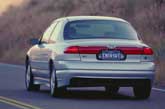
Page 4: Don't
DON'T - Stay away from a car that looks unkempt. Carefully evaluate the exterior and interior condition of the vehicle. It the car is unwashed or damaged, if the interior is ratty and unkempt, what are the chances the owner gave the vehicle an oil change every 5,000 miles? DON'T - No matter how difficult the seller gets, or how much he or she insists their vehicle doesn't need an inspection, do it anyway. And don't fall for the old Uncle Harry move, when sellers "suggest" a friendly technician to conduct the exam. Always take your prospective used car purchase to an independent service shop, and make sure they lift the hood and take a good hard look. DON'T - A negative vehicle is a red flag, and you should seriously consider walking -- very quickly -- away from the purchase. Examples include: Cars from natural disaster locales, repaired insurance "totals" (most titles identify salvaged wrecks), excessive mileage cars (more than 15 thousand miles per year), cars whose manufacturer has retreated from the US. Market, dramatically modified cars and vehicles from bankruptcy or law enforcement seizures.
DON'T - No certification, no sale. A certified used car has been reviewed by a technician and has met specific quality criteria.
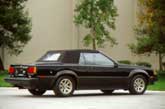
Page 5: Don't
DON'T - Stay away from used vehicles that offer no form of buyer protection, such as an initial 30-day warranty to protect your investment, and, even better, a 72-hour safety net in case something goes really wrong, really quickly. DON'T - You know the kind. They set up shop on tiny lots in city areas, with streamers and cars parked hither-dither. Stay away from used car salesmen because most get the used vehicle dregs at the vehicle auction -- after the large new car dealerships with used vehicle sections work over the picks. DON'T - Don't ever go out without research done and questions ready to ask. Most people don't ever remember the questions they were going to ask, so writing down five or 10 questions will keep you focused on the task at hand. DON'T - Try not to purchase used car information on the Internet, unless it's a vehicle report about that specific vehicle, by VIN. Most information about used, or new, vehicles is available at no charge from a variety of third-party and government web sites.
